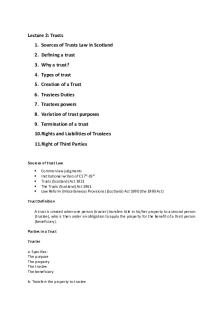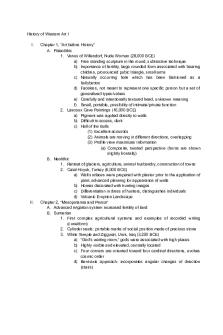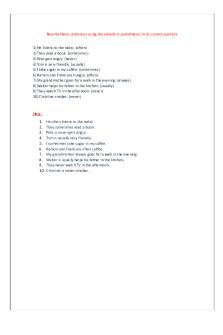Adverb - notes PDF

| Title | Adverb - notes |
|---|---|
| Author | faith hall |
| Course | Developmental Communication Arts |
| Institution | Crowder College |
| Pages | 2 |
| File Size | 32.7 KB |
| File Type | |
| Total Downloads | 32 |
| Total Views | 153 |
Summary
notes...
Description
Action verb- a verb that indicates a physical or mental action Adjective verb- a word that describes a noun or a pronoun Adverb- a part od speech that describes a verb, adjective, or another adverb Base form- the simplest form of a verb, free of alterations for tense, number, and point of view Clause- a word group that contains a subject and a verb Common noun- a noun that represents a non-specific person, place, thing, event, or idea Complete Sentence- a sentence that contains at least one subject and one predicate and expresses Complete thought- when a group of words is logically finished Conjunction- a part of speech that connects two or more words, phrases, or clauses in a sentence Coordinating conjunction- a conjunction that connects words or word groups of equal importance in a sentence Correlative conjunctions- conjunctions that connect two or more similar ideas and always appear in pairs Count noun- A noun that can be counted Declarative sentence- a sentence that makes a general statement that informs the reader Direct object- a word group that contains a subject and a verb but does not express a complete thought Direct question- a sentence that asks the audience a question and usually ends with a question mark Exclamation point- a punctuation that communicates emotion or surprise First-person pronoun- a pronoun used to refer to the speaker of the sentence Future Tense- A verb tense used to describe events or actions that have not yet taken place or to describe plans or instructions Gerund- A verbal that functions as a noun in a sentence and is formed by adding to the end of the verb Helping verb- A word that changes the form of the main verb so that it grammatically fits in the sentence Imperative sentence- A sentence that makes commands and often addresses the implied subject Implied pronoun- The subject of a sentence when the speaker is talking directly to the audience Indefinite pronoun- A pronoun that does not rename a specific noun Indefinite clause- A word group that contains a subject and a verb and expresses a complete thought Indirect object- A word that receives the direct object Indirect question- A sentence that tells the audience about a question and usually ends with a period Infinitive- A verbal that can function as a noun, adjective, or adverb in a sentence
Interjection- A word or group of words that add emphasis or emotion Interrogative sentence- A sentence that asks a question Linking verb- a verb that links subject to a description Main verb- The verb that expresses the primary action or state of being of a subject in a complete sentence Non-count noun- A noun that cannot be counted Noun- A word that represents a person, place, thing, event, or idea Object of a preposition- A word that completes the meaning of prepositional phrase Objective pronoun- A pronoun that functions as an object in a sentence Participle- A verb form that can function as an adjective Parts od speech- The categories that classify each type of word found in a sentence Past Tense- A verb tense used to report on an event or reflect on a past experience Period- A punctuation mark used to end sentences that make a statement or relay information...
Similar Free PDFs

Adverb - notes
- 2 Pages

Adverb clause
- 15 Pages

Adverb adjectives verbs
- 4 Pages

Adverb Hard - Grade: B+
- 3 Pages

Notes
- 18 Pages

Notes
- 12 Pages

Notes
- 61 Pages

Notes
- 35 Pages

Notes
- 19 Pages

Notes
- 70 Pages

Notes
- 6 Pages

Notes
- 35 Pages

Notes LAW121 (A+ NOTES!)
- 99 Pages

Notes
- 29 Pages

Notes
- 70 Pages
Popular Institutions
- Tinajero National High School - Annex
- Politeknik Caltex Riau
- Yokohama City University
- SGT University
- University of Al-Qadisiyah
- Divine Word College of Vigan
- Techniek College Rotterdam
- Universidade de Santiago
- Universiti Teknologi MARA Cawangan Johor Kampus Pasir Gudang
- Poltekkes Kemenkes Yogyakarta
- Baguio City National High School
- Colegio san marcos
- preparatoria uno
- Centro de Bachillerato Tecnológico Industrial y de Servicios No. 107
- Dalian Maritime University
- Quang Trung Secondary School
- Colegio Tecnológico en Informática
- Corporación Regional de Educación Superior
- Grupo CEDVA
- Dar Al Uloom University
- Centro de Estudios Preuniversitarios de la Universidad Nacional de Ingeniería
- 上智大学
- Aakash International School, Nuna Majara
- San Felipe Neri Catholic School
- Kang Chiao International School - New Taipei City
- Misamis Occidental National High School
- Institución Educativa Escuela Normal Juan Ladrilleros
- Kolehiyo ng Pantukan
- Batanes State College
- Instituto Continental
- Sekolah Menengah Kejuruan Kesehatan Kaltara (Tarakan)
- Colegio de La Inmaculada Concepcion - Cebu
